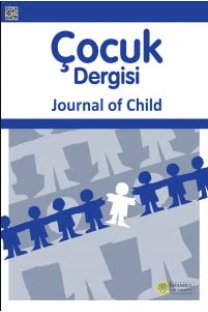COVID-19 Salgınında Ergenlerin Sağlığının Korunması ve Sürdürülmesi: Annelerin Perspektifinden
Anneler, COVID-19, SARS-CoV-2, ergen, sağlık davranışı
Health of Adolescents in the COVID-19 Outbreak: Perspectives from Mothers
Adolescent, COVID-19, SARS-CoV-2, health behavior, mothers,
___
- 1. Sprang G, Silman M. Posttraumatic stress disorder in parents and youth after health-related disasters. Disaster Med Public Health Prep 2013;7(1):105-10. DOI: 10.1017/dmp.2013.22.
- 2. Dong Y, Mo X, Hu Y, Qi X, Jiang F, Jiang Z, et al. Epidemiology of COVID-19 Among Children in China. Pediatrics 2020;145(6). DOI: 10.1542/peds.2020-0702.
- 3. Viner RM, Russell SJ, Croker H, Packer J, Ward J, Stansfield C, et al. School closure and management practices during coronavirus outbreaks including COVID-19: a rapid systematic review. Lancet Child Adolesc Health 2020;4(5):397-404. DOI: 10.1016/S2352-4642(20)30095-X.
- 4. Golberstein E, Wen H, Miller BF. Coronavirus Disease 2019 (COVID-19) and Mental Health for Children and Adolescents. JAMA Pediatr 2020;174(9):819-20. DOI: 10.1001/jamapediatrics.2020.1456.
- 5. Jiao WY, Wang LN, Liu J, Fang SF, Jiao FY, Pettoello-Mantovani M, et al. Behavioral and Emotional Disorders in Children during the COVID-19 Epidemic. J Pediatr 2020;221:264-6 e1. DOI: 10.1016/j. jpeds.2020.03.013.
- 6. UNICEF. Coronavirus (COVID-19) guide for parents 2020 Available from: Available from: https://www.unicef.org/parenting/ coronavirus-covid-19-guide-parents.
- 7. Ercan ES, Arman AR, Emiroğlu NI, Öztop DB, Yalçın Ö. Türkiye Çocuk ve Genç Psikiyatrisi Derneği COVID-19 Virüs Salgını Sırasında Aile, Çocuk ve Ergenlere Yönelik Psikososyal ve Ruhsal Destek Rehberi. 2020 (12/12/2020). Available from: https://www.ankara.edu.tr/ covid-19-virus-salgini-sirasinda-aile-cocuk-ve-ergenlere-yonelikpsikososyal- ve-ruhsal-destek-rehberi/.
- 8. Sinha IP, Harwood R, Semple MG, Hawcutt DB, Thursfield R, Narayan O, et al. COVID-19 infection in children. Lancet Respir Med 2020;8(5):446-7. DOI: 10.1016/S2213-2600(20)30152-1.
- 9. Shahhosseini Z, Simbar M, Ramezankhani A, Majd HA. Supportive family relationships and adolescent health in the socio-cultural context of Iran: a qualitative study. Ment Health Fam Med 2012;9(4):251-6.
- 10. Perrin EC, Leslie LK, Boat T. Parenting as Primary Prevention. JAMA Pediatr 2016;170(7):637-8. DOI: 10.1001/jamapediatrics.2016.0225.
- 11. Kaytez N, Durualp E, Kadan G. Engelli çocuğu olan ailelerin gereksinimlerinin ve stres düzeylerinin incelenmesi. Eğitim ve Öğretim Araştırmaları Dergisi 2015;4(1):197-214. Available from: http://jret.org/FileUpload/ks281142/File/19.kaytez.pdf.
- 12. Pettoello-Mantovani M, Pop TL, Mestrovic J, Ferrara P, Giardino I, Carrasco-Sanz A, et al. Fostering Resilience in Children: The Essential Role of Healthcare Professionals and Families. J Pediatr 2019;205:e1298-9. DOI: 10.1016/j.jpeds.2018.10.069.
- 13. Brooks SK, Webster RK, Smith LE, Woodland L, Wessely S, Greenberg N, et al. The psychological impact of quarantine and how to reduce it: rapid review of the evidence. The Lancet 2020;395(10227):912-20. DOI: https://doi.org/10.1016/S0140- 6736(20)30460-8.
- 14. Chen P, Mao L, Nassis GP, Harmer P, Ainsworth BE, Li F. Returning Chinese school-aged children and adolescents to physical activity in the wake of COVID-19: Actions and precautions. J Sport Health Sci 2020;9(4):322-4. DOI: 10.1016/j.jshs.2020.04.003.
- 15. Pietrobelli A, Pecoraro L, Ferruzzi A, Heo M, Faith M, Zoller T, et al. Effects of COVID-19 Lockdown on Lifestyle Behaviors in Children with Obesity Living in Verona, Italy: A Longitudinal Study. Obesity (Silver Spring) 2020;28(8):1382-5. DOI: 10.1002/oby.22861.
- 16. Xiang M, Zhang Z, Kuwahara K. Impact of COVID-19 pandemic on children and adolescents’ lifestyle behavior larger than expected. Prog Cardiovasc Dis 2020;63(4):531-2. DOI: 10.1016/j. pcad.2020.04.013.
- 17. Chen F, Zheng D, Liu J, Gong Y, Guan Z, Lou D. Depression and anxiety among adolescents during COVID-19: A cross-sectional study. Brain Behav Immun 2020;88:36-8. DOI: 10.1016/j. bbi.2020.05.061.
- 18. He K, Kramer E, Houser RF, Chomitz VR, Hacker KA. Defining and understanding healthy lifestyles choices for adolescents. J Adolesc Health 2004;35(1):26-33. DOI: 10.1016/j.jadohealth.2003.09.004.
- 19. Zhou SJ, Zhang LG, Wang LL, Guo ZC, Wang JQ, Chen JC, et al. Prevalence and socio-demographic correlates of psychological health problems in Chinese adolescents during the outbreak of COVID-19. Eur Child Adolesc Psychiatry 2020;29(6):749-58. DOI: 10.1007/s00787-020-01541-4.
- ISSN: 1302-9940
- Yayın Aralığı: Yılda 4 Sayı
- Başlangıç: 2000
- Yayıncı: İstanbul Üniversitesi
Nilüfer DEMİRSOY, Omur SAYLİGİL
Yenidoğanda Pulmoner Hipertansiyon ve Galen Ven Anevrizması Birlikteliği
Muhammet BULUT, Dilek KÜÇÜK ALEMDAR, Kıvanç ÇELİKKALKAN, Emine TEKİN, Özge EREN, Handan AYHAN AKOĞLU, Azime BULUT, İlknur OKUR AKŞAN, Seyyit Bahaettin ÖNCÜ
Çocukluk Çağı Astımında Obezite ve İnsülin Direncinin Astım Kontrolüne Etkisi
Esra ÖZEK, Haluk ÇOKUĞRAŞ, Yıldız CAMCIOĞLU, Necla AKÇAKAYA
Yöntem YAMAN, Murat ELLİ, Kürşat ÖZDİLLİ, Leyla TELHAN, Nihan BAYRAM, Volkan HAZAR, Ebru TUĞRUL, Şifa ŞAHİN, Sema ANAK
Çocuk Yoğun Bakımda Diyare İlişkili Hemolitik Üremik Sendrom: Tek Merkez Deneyimi
Caner ALPARSLAN, Mehmet Nur TALAY, Aysel TAKTAK, Murat KANĞIN
Fatma DUMANDAĞ, Selmin KÖSE, Güzide DOĞAN
Olgu Sunumu: Kistik Fibrosisi Taklit Eden Çölyak Hastalığı
Tuba KOÇKAR, Mustafa ÇİFTÇİ, Fırat ERDOĞAN, Tufan KUTLU, Sedat OKTEM
COVID-19 Salgınında Ergenlerin Sağlığının Korunması ve Sürdürülmesi: Annelerin Perspektifinden
Eyşan Hanzade UMAÇ, Ayfer AYDIN
Konjenital Böbrek ve İdrar Yolu Anomalisi Olan Çocukların Tek Merkezli Retrospektif Kohort Analizi
Büyüme Gelişme Geriliği Olan Vaka- Pozitif Ter Testinin Ötesinde Bir Araştırma
Sara Maria MOSCA FERREİRA DA SİLVA, Telma BARBOSA, Ana TEİXEİRA, Céu R. MOTA, Teresa COSTA, Liane CORREİA-COSTA
